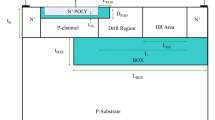Abstract
Higher device reliability and lower device-to-device variability are needed to improve the density and yield of integrated circuits. A high pressure deuterium annealing (HPDA) process is proposed for this purpose. Gate-enclosed n-MOSFETs were fabricated on silicon substrate as test vehicles. Then, secondary ion mass spectrometry was performed to verify deuterium absorption. After that, device parameters such as gate leakage, threshold voltage, and subthreshold swing were measured, and the values before and after the HPDA process were compared. The results confirmed device reliability as well as device-to-device variability were improved by the proposed HPDA process.




Similar content being viewed by others
References
C. Hu, Future CMOS scaling and reliability. Proc. IEEE. 81(5), 682–689 (1993)
E.-S. Cho, S.J. Kwon, Novel process technologies of a deep-submicron MOSFET for the high packing density of circuits. J. Semicond. Technol. Sci. 21(6), 459–465 (2021)
D.-W. Cha, J.-Y. Park, Impact of dielectrics in SOI FinFET for lower power consumption in punch-through current-based local thermal annealing. J. Semicond. Technol. Sci. 21(3), 222–228 (2021)
J.-Y. Park, W.-G. Kim, H. Bae, I.K. Jin, D.-J. Kim, H. Im, I.-W. Tcho, Y.-K. Choi, On-chip curing by microwave for long term usage of electronic devices in harsh environments. Sci. Rep. 8, 14953 (2018)
T.R. Oldham, F.B. McLean, Total ionizing dose effects in MOS oxides and devices. IEEE Trans. Nucl. Sci. 50(3), 483–499 (2003)
D. Keum, H. Kim, Proton-irradiation effects on charge trapping-related instability of normally-off AlGaN/GaN recessed MISHFETs. J. Semicond. Technol. Sci. 19(2), 214–219 (2019)
J.R. Schwank, M.R. Shaneyfelt, D.M. Fleetwood, J.A. Felix, P.E. Dodd, P. Paillet, V. Ferlet-Cavrois, Radiation effects in MOS oxides. IEEE Trans. Nucl. Sci. 55(4), 1833–1853 (2008)
E. Valtonen, Space weather effects on technology in space weather (Springer, Berlin, Heidelberg, 2004), pp.241–273
D.-H. Wang, J.-Y. Ku, D.-H. Jung, K.-S. Lee, W.C. Shin, B.-D. Yang, J.-Y. Park, Impact of iterative deuterium annealing in long-channel MOSFET performance. Materials 15(5), 1960 (2022)
J.-Y. Park, T.J. Yoo, J.-M. Yu, B.H. Lee, Y.-K. Choi, Impact of post-metal annealing with deuterium or nitrogen for curing a gate dielectric using joule heat driven by punch-through current. IEEE Electron. Device Lett. 42(2), 276–279 (2021)
J.-M. Yu et al., Quantitative analysis of high-pressure deuterium annealing effects on vertically stacked gate-all-around SONOS memory. IEEE Trans. Electron. Devices 67(9), 3903–3907 (2020)
J. Lee et al., Application of high pressure deuterium annealing for improving the hot carrier reliability of CMOS transistors. IEEE Electron. Device Lett. 21(5), 221–223 (2000)
I.C. Kizilyalli, J.W. Lyding, K. Hess, Deuterium post-metal annealing of MOSFET’s for improved hot carrier reliability. IEEE Electron. Device Lett. 18(3), 81–83 (1997)
W.F. Clark, T.G. Ference, T.B. Hook, K.M. Watson, S.W. Mittl, J.S. Burnham, Process stability of deuterium-annealed MOSFET’s. IEEE Electron. Device Lett. 20(1), 48–50 (1999)
J.W. Lyding, K. Hess, I.C. Kizilyalli, Reduction of hot electron degradation in metal oxide semiconductor transistors by deuterium processing. Appl. Phys. Lett. 68, 2526–2528 (1996)
H.C. Mogul et al., Electrical and physical characterization of deuterium sinter on submicron devices. Appl. Phys. Lett. 72(14), 1721–1723 (1998)
N. Arora, MOSFET models for VLSI circuit simulation (Springer, Vienna, 1993), p.443
A. Subirats et al., Trap reduction and performances improvements study after high pressure anneal process on single crystal channel 3D NAND devices, in: 2018 IEEE International Electron Devices Meeting (IEDM) (2018), pp. 25.4.1–25.4.4
S.-M. Cho et al., High-pressure deuterium annealing effect on nanoscale strained CMOS devices. IEEE Trans. Electron. Devices 8(1), 153–159 (2008)
H. Sim, H. Hwang, Effect of deuterium postmetal annealing on the reliability characteristics of an atomic-layer-deposited HfO2/SiO2 stack gate dielectrics. Appl. Phys. Lett. 81, 4038–4039 (1996)
D.-H. Jung, W.C. Shin, M.-K. Kim, J.-Y. Ku, D.-H. Wang, K.-S. Lee, J.-Y. Park, High pressure deuterium annealing for improved immunity against stress-induced threshold voltage degradation. IEEE Trans. Device Mater. Reliab. 22(3), 457–461 (2022)
K. Cheng, J. Lee, J.W. Lyding, Approach to enhance deuterium incorporation for improved hot carrier reliability in metal-oxide-semiconductor devices. Appl. Phys. Lett. 77(15), 2358–2360 (2000)
G.P. Pollack et al., Hydrogen passivation of polysilicon MOSFET’s from a plasma nitride source. IEEE Electron. Device Lett. 5(11), 468–470 (1984)
R. Choi et al., Fabrication of high quality ultra-thin HfO2 gate dielectric MOSFETs using deuterium anneal. in Digest. International Electron Devices Meeting (2002), pp. 613–616
K. Onishi et al., Improvement of surface carrier mobility of HfO2 MOSFETs by high-temperature forming gas annealing. IEEE Trans. Electron. Devices 50(2), 384–390 (2003)
Acknowledgements
This work was partially supported by the National Research Foundation of Korea (No. 2020M3H2A1076786 and 2021R1F1A1049456). This research was also partially supported by Nano·Material Technology Development Program through the National Research Foundation of Korea (NRF) funded by the Ministry of Science, ICT and Future Planning (2009-0082580). This work was also partially sponsored by IC Design Education Center (EDA Tool).
Author information
Authors and Affiliations
Corresponding author
Additional information
Publisher’s Note
Springer Nature remains neutral with regard to jurisdictional claims in published maps and institutional affiliations.
Rights and permissions
Springer Nature or its licensor (e.g. a society or other partner) holds exclusive rights to this article under a publishing agreement with the author(s) or other rightsholder(s); author self-archiving of the accepted manuscript version of this article is solely governed by the terms of such publishing agreement and applicable law.
About this article
Cite this article
Jung, DH., Yoon, SS., Ku, JY. et al. Improvement of Device Reliability and Variability Using High Pressure Deuterium Annealing. Trans. Electr. Electron. Mater. 24, 1–4 (2023). https://doi.org/10.1007/s42341-022-00422-8
Received:
Revised:
Accepted:
Published:
Issue Date:
DOI: https://doi.org/10.1007/s42341-022-00422-8




